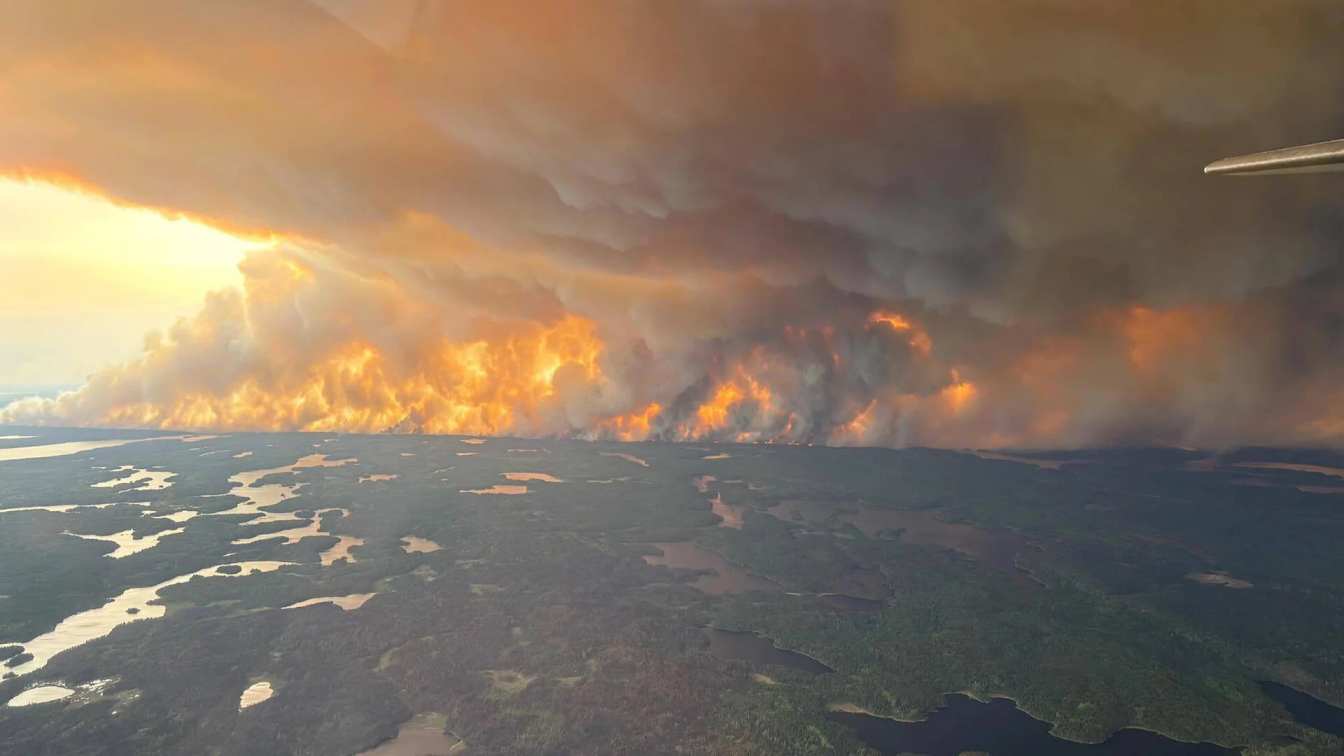Wildfires force thousands to flee in Canada

The bulk of the evacuations occurred in Manitoba, which declared a state of emergency last week.
Over 25,000 people across three Canadian provinces have been forced to evacuate as numerous wildfires continued to burn on Sunday, contributing to deteriorating air quality in parts of both Canada and the United States, officials reported.
The bulk of the evacuations occurred in Manitoba, which declared a state of emergency last week.
By Saturday, approximately 17,000 residents had been displaced there.
In Alberta, around 1,300 individuals were relocated, while in Saskatchewan, about 8,000 people had been evacuated, with authorities cautioning that the figure could rise.
Smoke from the wildfires has been severely affecting air quality and visibility across parts of Canada and even into several U.S. border states.
Saskatchewan’s Public Safety Agency issued a warning Sunday, noting that “air quality and visibility due to wildfire smoke can fluctuate over short distances and vary significantly throughout the day.” Officials emphasized that rising smoke levels also elevate health risks.
Saskatchewan Premier c said reinforcements, including firefighters, emergency personnel, and aircraft from other provinces and U.S. states such as Alaska, Oregon, and Arizona have been dispatched to support the firefighting efforts.
"We are truly grateful, and we stand stronger because of you," Moe wrote in a social media post.
He acknowledged that ongoing hot and dry conditions are fueling the wildfires, straining firefighting efforts and resources for evacuees.
"The next four to seven days are absolutely critical," Moe said during a news briefing on Saturday.
"We need a shift in weather and, ideally, a soaking rain across the north."
In Manitoba, over 5,000 evacuees are from Flin Flon, situated about 645 kilometers (400 miles) northwest of Winnipeg. Meanwhile, a fire in northern Manitoba disrupted power in
The wildfire threatening Flin Flon ignited last week near Creighton, Saskatchewan, before quickly crossing into Manitoba.
Fire crews have faced major challenges in containing it, with efforts hampered by thick smoke and even a drone incursion that temporarily grounded water bombers.
To aid in the response, the U.S. Department of Agriculture’s Forest Service dispatched an air tanker to Alberta and committed to sending 150 firefighters along with equipment to support Canadian efforts.
Meanwhile, smoke from the fires has triggered “unhealthy” air quality levels in parts of the U.S. On Sunday, areas of North Dakota, as well as portions of Montana, Minnesota, and South Dakota, were affected, according to the U.S. Environmental Protection Agency’s AirNow monitoring system.
“We can expect at least a couple more waves of Canadian smoke moving through the U.S. in the coming week,” said Bryan Jackson, a meteorologist with the U.S. National Weather Service.
In a separate incident, a wildfire in Idaho, a state that borders Canada, had scorched at least 100 acres (40 hectares) by Sunday.
The blaze led to road closures and evacuations, and officials with the Idaho Department of Lands confirmed that at least one structure had been destroyed, though further details on the damage were not provided.
Firefighters battling the blaze that erupted Saturday have been hampered by strong winds of 15 to 20 mph (24 to 32 kph) and challenging, steep terrain.
In Manitoba, evacuation centers have been set up across the province, including one as far south as Winkler, just 20 kilometers (12 miles) from the U.S. border.
In Winnipeg, public buildings have been opened to accommodate evacuees, as local hotels are already at capacity with a mix of wildfire refugees, tourists, business travelers, and convention attendees.
At a press briefing on Saturday, May 31, 2025, Indigenous leaders from Manitoba expressed concern about the strain on shelter resources.
They urged the government to intervene and prioritize hotel accommodations for displaced residents.
Grand Chief Kyra Wilson of the Assembly of Manitoba Chiefs described the situation as one of the most significant evacuations the province has seen since the 1990s.
"It’s heartbreaking to see children sleeping on floors, families waiting in hallways or outside with nowhere to go," Wilson said.
"People are exhausted. Right now, we need everyone to come together and support one another."
Canada’s wildfire season typically spans from May to September.
The most severe wildfire season on record occurred in 2023, when relentless blazes blanketed large parts of North America in hazardous smoke for months, impacting air quality and daily life across the continent.
